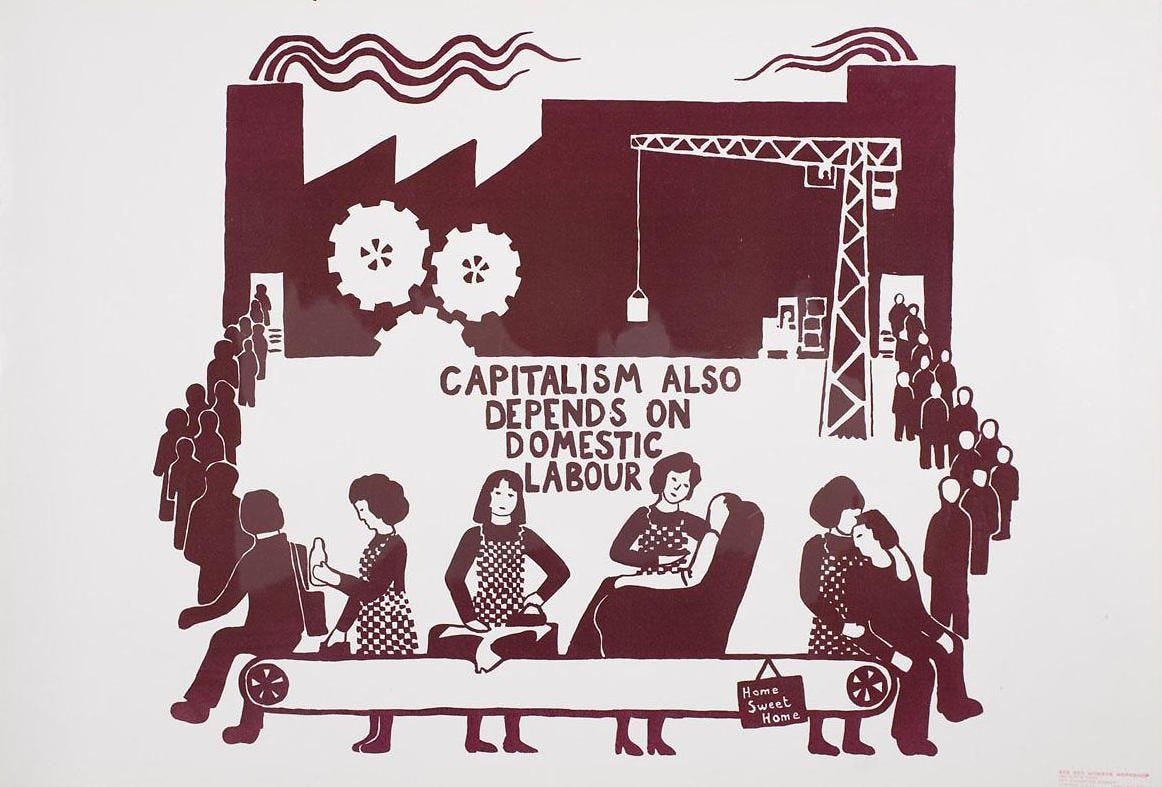Hello ji,
Back when we were in our first jobs, my friend Anu would regale me with her ambitious plans of becoming a housewife someday. She would point to a random flat's window and say, "I will live in a house like that. I will sit at a window like that in the middle of a working day, wearing a skincare mask on my face, and a cup of tea in my hand. While you people slog away in offices, I will sit at home and mock you."
She'd have me howling with laughter, as she went on detailing the gala time she will have in this imaginary life of luxury and comforts.
Today, I am a mom, as is Anu. That, and covid, have given us a slightly better idea of what it is like for a mom to "sit at home".
So I set about talking to some Stay At Home Moms (SAHMs) to figure out just how much of a gala time they have, really. I spoke with Smruthi, Preeti, Aditi, and Aaradhana - all of whom chose to be SAHMs. And then, there is the story of Meeta who was not given an option in the matter.
Welcome to the Fabulous Lives of Indian Housewives.
What is a day in your life like?
Smruthi had a full-time job. On a typical morning, she would exercise, drink coffee (made by her loving husband), eat breakfast, leave for work. After work, a walk, a quiet dinner, and sleep. She had househelp for cooking and cleaning, so her focus was entirely on her job and health. After having a baby, she chose to quit her job. With covid, she lost all household help as well.
"These days, I wake up and immediately attend to the baby, then make breakfast, do the dishes, take the garbage out, put a load of laundry, back to baby care, cook lunch for all, do the dishes, baby care, cook dinner for all, more dishes, more baby care. Whenever I get a moment, I tidy up after everyone, while planning more tasks to be done."
Preeti says that the day never seems to end for her.
"I am constantly working - either actively engaging my toddler or passively researching activities, events, schools, etc. I also manage household chores. Often, I have to choose between having a very messy home or a very cranky baby. And it all ends with sleepless nights feeding the baby. It has been three years since I've watched a movie, gone out, or shopped beyond essentials."
Aaradhana feels that there are a lot of unreasonable expectations from mothers these days.
"Even 'child's play' has become complicated - it must include the right kind of stimulation, physical and mental activity, be constructive play, well mannered play, independent play - all under your watchful eye. In the middle of the craziest day, you are expected to remain calm, composed, never say no, never raise your voice. Being a caring mother is no longer enough. You need to be a teacher, a coach, a role model and everything in between. All this takes a a huge physical, emotional, and psychological toll."
What is your role in your husband's career?
When Preeti's baby was a month old, her husband moved countries to pursue a better job opportunity.
"I stayed back in India managing the baby by myself for 9 months. Meanwhile, my husband was able to concentrate on work, make a mark in his organization, and build professional skills. He was promoted within 6 months and is now heading a department at a very big firm. He was able to progress by leaps and bounds in his career because he knew I was at home, taking care of our child."
Aaradhana echoes this, "My husband is extremely supportive, yet one cannot deny that because I am with our child practically all day, he can focus on his career and his personal development."
At least Preeti and Aaradhana had a choice in the matter. Not every stay at home mother even has the privilege of choosing whether or not to make this sacrifice.
Thirty years ago, Meeta married an officer in the Air Force and had to discontinue her Ph.D. to move town-to-town with her husband's postings. They had two kids. She would take up small jobs whenever he was posted in a city but would have to quit as soon as he got transferred.
Her sacrifice was never acknowledged by her husband.
At one point, he was actively thinking about taking voluntary retirement from his service. He had been posted in Delhi for a few years where Meeta got a job and even a promotion. For the first time, she saw her career going somewhere.
When his transfer orders came next, Meeta suggested he now take the retirement he had been planning, as she finally saw a professional future for herself in Delhi. He firmly said he would continue with his job, which meant she had to sacrifice her career all over again.
Within a few years, he took voluntary retirement anyway.
"I sacrificed my entire life for him, his home, and our children so he could have his career. But when I needed it the most, he didn't consider my career worth sacrificing just a few years in a job he was anyway planning to quit."
Do you feel supported by your family, friends, and society?
When Aditi decided to quit her job after having a baby, a male friend tried to convince her to drop the idea.
"It quickly turned into an argument. I told him to talk to me after having a child of his own. His response was, "I will never allow my wife to quit her job." I was shocked. Maybe he thought he was being progressive, but to keep or quit a job is every individual's personal decision to make. No one should be able to take that right away from them. My friend has stopped speaking to me after this conversation - so enraged is he over my decision to take a few years off my career to raise my child."
Preeti says that everyone has an opinion about women, whether they work or stay back at home.
"My in-laws were very judgmental when I was working long hours before the baby. Now, they judge me for not earning despite being highly qualified. My own parents are disappointed that their daughter - who could rule boardroom meetings - chooses to be 'just a mum'."
Aaradhana feels that it is a lose-lose situation for mothers.
"If I chose a career and no kids, that would be sacrilege. If I chose a career and kids then I would be selfish too. Now that I have chosen no full-time career and only kids, there is a feeling that this is my God-given duty, therefore doing it does not need to be respected."
As the onslaught of outside judgment continues, many women also battle our own social conditioning that household work does not carry the same worth as the work done in an office cubicle.
Smruthi says, "The person who judges me most harshly, is me. I resent having to constantly worry about chores. I was raised to believe I’d go on to do 'great things', so when I find myself stuck doing and thinking about dishes, I feel despondent."
Does your family thank you?
Stay at home moms and wives say they would be fine doing everything they do, if only they got a work of acknowledgment or gratitude every once in a while.
Aaradhana says that while her in-laws are happy to have her at home taking care of the baby, the acknowledgment is just not there.
"The kind of respect and compliments that my husband receives if he spends a weekend with our child is unparalleled to anything that comes my way."
Smruthi says, "My day job used to begin and end at a set time, including weekends, leaves. Now, my working hours begin when I open my eyes in the morning, continue till I fall asleep, and include several wake-ups in the middle of the night, with no leaves or weekends. All this allows my husband to carry about his job in the day and get good rest at night. Yet, I don't get any acknowledgment from him."
What is the effect of all this work being unpaid?
The Supreme Court recently highlighted the need to assign a monetary value to women's unpaid labour at home. The Court has a point. Clearly, what goes unpaid, goes unappreciated.
Preeti calls her work 'Family Management'.
"This is probably the most under-appreciated job. We do not get paid for being on our toes 24×7. I am based in Dubai, and the amount of hours I put in every day would have cost us about $1000 per month for day care/nursery, and another $1000 for a full time help. I don't think money should be a measure of the respect you get, but sadly that is the norm in our society."
Smruthi thinks that the change has to come from within the Great Indian family structure.
"We are the only kind of workers who will work non-stop voluntarily. We will never go on strike. We are not going to quit. You can assess the monetary value of this labour, but that number is not something we can wear as a tag everyday. The only way this labour is felt and respected, is when men (and children) join in and attempt to do some of it themselves."
Ultimately, money matters.
Meeta's lack of financial independence made her in-laws treat her as "a second-grade member of the family."
"I would be left out of all financial planning and investment decisions. In fact, I had to go to my husband with 'requests' every time I wanted to buy something."
She fights back tears while sharing a painful memory.
"I remember - shortly after we got married - I wanted to buy a small pair of tweezers to pluck my eyebrows with. I asked my husband for money to buy it. He began interrogating me - why did I need it, couldn't I manage without it, etc. This happened 30 years ago but the memory still haunts me today, because it was the first of many times in my life that I had to justify minor personal expenses to him. It made me feel so small."
So what needs to change?
Preeti wants the world to understand that "Not all of us have the same family support, not all of us have the same financial situation, not everyone is cut from the same cloth. So stop judging. Stop comparing."
Aaradhana says, "if the world thinks of me as an intelligent woman, then it needs to respect my intelligence in making my own career decisions as well. I am confident that this experience will make me a better person, a better leader in the future. In the meantime, some words of encouragement and positivity would be great."
Meeta recently separated from her husband and is now working as a freelance writer.
"I have never slept better in my life", she says.
So go, hug your stay-at-home mom or wife today. Prostrate yourself at her feet and thank her for everything - seen and unseen - that she does for you.
And husbands, a credit card or bank account in her name would be nice - after all, you do owe your entire paycheck to her.
Meanwhile in GaLa Land
In the middle of the afternoon on a weekday, my friend, Anu, can still be found at her office desk.
"It angers me that, for ages, men have been chilling - and by 'chilling', I mean having a normal, intellectually stimulating, adult day - at work and also coming home to their wives, expecting to be pampered. All the while, the really hard physical and mental labor was done by the wife staying back at home. I come to my office and feel incredibly grateful to have a place to poop in peace! I have nothing but respect for SAHMs now!"
Turns out, she and I were not cut out for the gala life, after all.
Mahima
This newsletter comes to you free of cost. But that does not mean that it costs nothing.
Womaning in India is a physical, mental, and emotional labour of love. If you appreciate the work I am doing with it, you can show me your love by buying me a coffee.








Its me again... I'm getting hooked to your posts. I have a slight different take on this one and I will quote one of my favourite movie 'If you are good at something, never do it for free'. While I totally support one parent taking up full time parenting, why don't I see more men take this up. Is it because women are more 'suited' for taking care of children? This was busted when I saw a Netflix documentary on how irrespective of gender, the person who is the primary care giver has a slightly enlarged amygdala. This got me to the conclusion that it is social conditioning that makes us think women are more suited to look after the home.
Hey Mahima, you write really well. Routine things. Taken for granted by half of the humanity. Your style, weaving the theme, control over narrative, choice of words and phrases and the lucid presentation makes it even more attractive to read. Please bring more of the kind!